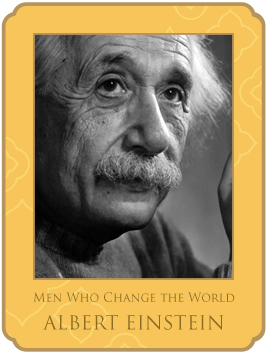Dhamma Explaination by Phramaha Wuthichai Vajiramedhi

All the great theories discovered by Einstein allow scientists to further led to the development of technologies we see and use in our daily lives.
We may not know that Albert Einstein, in his paper, On the Quantum Theory of Radiation, laid the foundation for the invention of the laser. Today, lasers are used in a broad range of everyday applications including supermarket barcode readers, in surgery with smaller cuts, allowing for less pain and faster recovery and to precisely cut metal.
Global Positioning System or GPS owes a debt of gratitude to Einstein and his Theory of General and Special Relativity to determine latitude, longitude and altitude to accuracy.
In 1922, The Nobel Prize in Physics 1921 was awarded to Albert Einstein "for his services to Theoretical Physics, and especially for his discovery of the law of the photoelectric effect". In 1999, Time recognized Albert Einstein as the Person of the Century.

Why a genius scientist views Buddhism this way and what happens if we define Buddhism with science?
Albert Einstein, the scientist of the era, interestingly expressed his perspective on Buddhism:
As a scientist, Einstein also believed in what can be proved by science's methods. So when Einstein said that a religion should transcend a personal God and avoid dogmas and theology, it means he did not believe in gods and theology. But he suggested that the religion of the future should have foundation on a person’s physical and spiritual experience. We, as a Buddhist, should also ask ourselves that why Einstien said so.
For example, science and religion both seek the truth of things and life.
While science reveals physical truth, Buddism offers spiritual truth. Buddhism aims at resolving the problem of human existence. Science aims to increase our understanding on things. But now science also studies mental aspects of human life and meditation has increasingly gained interested in the modern science world.
We must admit that nothing is perfect and each has its own limitation. Buddhism is no exception. Over a thousand years, Buddhism has included an analysis of human psychology.
The highest purpose of Buddhist practice is to enlighten and end suffering. Although some may achieve it, but one needs to practice until perfect it to truly understand the essence of the path to enlightenment. Science has limits and scientific theories are always changing. Change in knowledge is inevitable as new observations, new technology or applications of technology emerge.
In July 2012, CERN, the European Organization for Nuclear Research (1), announced the discovery of a new sub-atomic particle. This could be one of the biggest scientific discoveries of the century.
Before this discovery, science thought that the atom was the smallest indivisible component of matter. And atoms are made up of protons, neutrons, and electrons. Recently, CERN had discovered the subatomic particle, Higgs Boson or 'God particle.' This makes us realise that atoms themselves are made of more fundamental particles: electrons, protons and neutrons. And among these is Higgs’ particle.
*(1) CERN is derived from the acronym for the French "Conseil Europen pour la Recherche Nuclaire", or European Council for Nuclear Research
" I think that the scientific discovery harmonizes with the Buddhist teaching. Every existing thing is derived from another aspect. No-self. Nothing lasts forever. Pain does not last. Everything is a result of something else. Eventually, everything is empty.
One good example is to come prove it. If you want to know, you can try meditation, walking meditation, or practice the Buddha’s teachings. If the Buddha said that having a peaceful mind assures a healthy life, you can prove it by meditating. If the Buddha said that harming others causes you pain, you can prove it by hitting someone and see if you can remain calm and peaceful.
Buddhism and science share the same basic purpose of truth discovery.
Buddha discovered the four noble truths 2,600 years ago. Now his teaching becomes timeless. The Buddha's teaching of anatta, or no-self to illustrate the transitivity of identity, is still proven true globally. Some teachings even get clearer. The Buddha also said that all things depend on one another. The world lives in us and we live in the world. Whatever affects one, affects all. Our negative change can have impacts like falling dominoes. Humanity’s carelessness towards the environment will inevitably affect the human race. This is the foundation of Buddhism: the Law of Cause and Effect.
The Buddha encouraged people to think and investigate the truth. Believe nothing until you have experienced it. Buddhism does not demand blind faith. You need to learn and practice to achieve the essence of Buddhism.
Scientific discoveries can alter and expand human knowledge and understanding. Einstein's theory of general relativity truly changed the way we understand our universe. Now we learn about the birth of the universe in a Big Bang.
I think we may not need to learn everything about our Milky Way, Galaxy, and the Universe. We are a part of the universe. And the universe is yet incomplete without any existing lives. Therefore, if we understand the natural world and ourselves that how huge the universe is and how small we are. We need to study ourselves before study the aspects of the universe.
©TruePlookPanya
